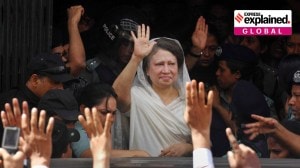Cops and robbers
The Mumbai city police are in a state of shock. A highly acclaimed force has lost its sheen. A joint commissioner in the rank of an IGP, who...

The Mumbai city police are in a state of shock. A highly acclaimed force has lost its sheen. A joint commissioner in the rank of an IGP, who was once in charge of its elite Crime Branch, has been arrested in the Telgi stamp paper scam! The commissioner, R.S. Sharma, is being questioned in the same case. He has been reduced to a lame duck in the last month of his service! In fact, his ordeal began four months ago when the high court took cognizance of a PIL filed by that anti-corruption crusader, the highly respected Anna Hazare.
The people of Mumbai are bewildered. They do not know what has hit their once acclaimed police force. What has caused it to decline so rapidly? At the best of times it is not easy to police this metropolis with its juxtaposition of abject poverty and conspicuous wealth. But the entry of the Shiv Sena into the corridors of state power a decade ago changed for the worse the way the government was run. Sycophancy took on new dimensions. Worse was in store. With the induction of a Shiv Sena rebel in the home ministry four years ago all semblance of decency evaporated.
Police corruption is as old as the hills. There is corruption in the police forces of other cities in India and in the world. There was corruption in Mumbai8217;s police force in British times. But till as late as twenty to thirty years ago corruption was confined to the junior ranks. The supervisory level, drawn mainly from the Indian Police Service, was almost overwhelmingly free of this malaise. This supervisory level was both feared and respected. They laid down norms and led by example. In short, their supervision ensured justice for the common citizen.
With the nationwide fall in values from the early seventies, a growing number of officers shifted their focus from serving the people to serving their own interests. This trend became more apparent in the eighties. By the last decade of the century the number of those who had fallen by the wayside had increased considerably.
Shridhar Vagal, recently arrested in the Telgi scam, was an IIT and IIM Ahmedabad graduate, qualifications that would ensure a six figure salary in the private sector. In the police he earned about Rs 25,000 a month after 25 years of service, but is alleged to possess property worth Rs 25 crore, if newspaper articles are to be believed. His two juniors, who have also been arrested, reportedly amassed Rs 50 crore and Rs 100 crore, respectively, figures that are truly mind-boggling. It shows that corruption in the force today is motivated by greed rather than by need, as was the case in the past.
The cancer of corruption has emasculated the senior ranks, nullifying the supervisory role that was assigned to them in the scheme of things. It is but natural that the ordinary citizen cannot turn to the supervisors for redress if the supervisors themselves are corrupt.
In the old days of need-based corruption, confined as it was to the junior ranks of the force, the elements of shame and fear predominated. Shame and fear no longer exist. They evaporated over a period of time with the advent of unscrupulous politicians hankering for money and muscle to fight and win elections. These venal politicians used, or rather misused, the weapon of appointments and transfers to politicise the force and lure officers to do their bidding in return for lucrative or glamorous appointments. Over the past two decades lobbying for plum posts has become the norm. Even worse are the persistent rumours of monies changing hands for securing such posts in this once well-administered state.
This pernicious practice is bound to destroy the force. An officer who has paid for securing a job is more concerned with recouping his investment and then multiplying it. The message goes all the way down the line: 8220;The boss wants more.8221; Complaints of rampant extortion in police thanas are the logical outcome. Hence it is incumbent to remove the power of appointments and transfers from the hands of politicians and entrust it to an independent body of men and women. They can meet under the chairmanship of the home minister but should enjoy the real authority to appoint good officers instead of the wrong ones, as is presently the norm.
The whole system of transfers and appointments has to be carefully studied and codified into law so that power is not misused for individual or party gains. A PIL is pending in the Supreme Court on this very issue. It has been filed by a very distinguished and reputed retired IPS officer, Prakash Singh, former DG of Uttar Pradesh and former DG of the BSF. He has been supported by no less a person than H.D. Shourie and also by the National Human Rights Commission which has intervened in the PIL and urged the court to save the people from the depredation of reckless politics.
Maharashtra8217;s home minister appears to have blatantly favoured the corrupt and sidelined the honest. Upright men like Arvind Inamdar, Ronnie Mendonca and Sanjeev Dayal have been eased out and, if things carry on like this, the force will be stacked only with the likes of those who will follow Shridhar Vagal to jail. Incidentally, Vagal8217;s appointment to head the Crime Branch was itself a shocker. It certainly stunned the rank and file as his proclivities were known to one and all.
The need of the hour is for civil society to organise and protest against the castration of the police force, particular of its IPS cadre. Mercifully this state still has outstanding men but they do not fit into the minister8217;s scheme. People should use the Right to Information Act and seek redress from the courts through PILs, like Anna Hazare has done. If the court had not intervened in the Telgi matter, officers like Vagal would have got off and thrived under the protective shield of their political master.
The writer served as police commissioner of Mumbai and later as head of the Punjab Police
- 01
- 02
- 03
- 04
- 05































